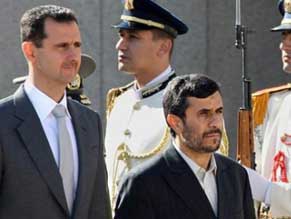|
World Jewish News

Photo by AP.
|
UN report: Iran, Syria receiving North Korea nuclear technology
28.05.2010, International Organizations North Korea is exporting nuclear and ballistic missile technology and using multiple intermediaries, shell companies and overseas criminal networks to circumvent U.N. sanctions, UN experts said in a report obtained by The Associated Press.
The seven-member panel monitoring the implementation of sanctions against North Korea said its research indicates that Pyongyang is involved in banned nuclear and ballistic activities in Iran, Syria and Myanmar. It called for further study of these suspected activities and urged all countries to try to prevent them.
The 47-page report, obtained late Thursday by AP, and a lengthy annex document sanctions violations reported by U.N. member states, including four cases involving arms exports and two seizures of luxury goods by Italy - two yachts and high-end recording and video equipment. The report also details the broad range of techniques that North Korea is using to try to evade sanctions imposed by the U.N. Security Council after its two nuclear tests in 2006 and 2009.
Council diplomats discussed the report by the experts from Britain, Japan, the United States, France, South Korea, Russia and China at a closed-door meeting on Thursday.
Its release happened to coincide with heightened tensions between North Korea and South Korea over the March sinking of a South Korean navy ship which killed 46 sailors. The council is waiting for South Korea to decide what action it wants the U.N.'s most powerful body to take in response to the sinking, which a multinational investigation determined was caused by a North Korean torpedo.
The panel of experts said there is general agreement that the UN embargoes on nuclear and ballistic missile related items and technology, on arms exports and imports except light weapons, and on luxury goods, are having an impact.
But it said the list of eight entities and five individuals currently subject to an asset freeze and travel ban seriously understates those known to be engaged in banned activities and called for additional names to be added. It noted that North Korea moved quickly to have other companies take over activities of the eight banned entities.
The experts said an analysis of the four North Korean attempts to illegally export arms revealed that Pyongyang used "a number of masking techniques" to avoid sanctions. They include providing false descriptions and mislabeling of the contents of shipping containers, falsifying the manifest and information about the origin and destination of the goods, "and use of multiple layers of intermediaries, shell companies, and financial institutions," the panel said.
It noted that a chartered jet intercepted in Thailand in December carrying 35 tons of conventional weapons including surface-to-air missiles from North Korea was owned by a company in the United Arab Emirates, registered in Georgia, leased to a shell company registered in New Zealand and then chartered to another shell company registered in Hong Kong - which may have been an attempt to mask its destination.
North Korea is also concealing arms exports by shipping components in kits for assembly overseas, the experts said.
As one example, the panel said it learned after North Korean military equipment was seized at Durban harbor in South Africa that scores of technicians from the North had gone to the Republic of Congo, where the equipment was to have been assembled.
The experts called for "extra vigilance" at the first overseas port handling North Korean cargo and close monitoring of airplanes flying from the North, saying Pyongyang is believed to use air cargo "to handle high valued and sensitive arms exports."
While North Korea maintains a wide network of trade offices which do legitimate business as well as most of the country's illicit trade and covert acquisitions, the panel said Pyongyang "has also established links with overseas criminal networks to carry out these activities, including the transportation and distribution of illicit and smuggled cargoes."
This may also include goods related to weapons of mass destruction and arms, it added.
Under council resolutions, all countries are required to submit reports on what they are doing to implement sanctions but as of April 30 the panel said it had still not heard from 112 of the 192 U.N. member states — including 51 in Africa, 28 in Asia, and 25 in Latin America and the Caribbean.
While no country reported on nuclear or ballistic missile-related imports or exports from North Korea since the second sanctions resolution was adopted last June, the panel said it reviewed several U.S. and French government assessments, reports from the International Atomic Energy Agency, research papers and media reports indicating Pyongyang's continuing involvement in such activities.
These reports indicate North Korea "has continued to provide missiles, components, and technology to certain countries including Iran and Syria ... (and) has provided assistance for a nuclear program in Syria, including the design and construction of a thermal reactor at Dair Alzour," the panel said.
Syria denied the allegations in a letter to the IAEA, but the UN nuclear agency is still trying to obtain reports on the site and its activities, the panel said.
The experts said they are also looking into "suspicious activity in Myanmar," including activities of Namchongang Trading, one of the companies subject to UN sanctions, and reports that Japan in June 2009 arrested three individuals for attempting to illegally export a magnetometer — which measures magnetic fields — to Myanmar via Malaysia allegedly under the direction of a company known to be associated with illicit procurement for North Korea's nuclear and military programs. The company was not identified.
Haaretz.com
|
|
